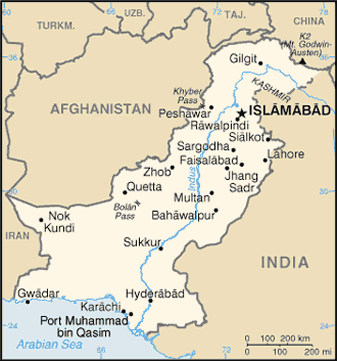The rising political tensions between India and Pakistan are having a direct impact on Afghanistan and the rest of Central Asia. The two regional powers have traded influence in Afghanistan to try and outmaneuver the other and it is Pakistan's security apparatus's greatest fear right now that India currently has the upper-hand with US-backed Karzai government.
We all know the tremendous linkages between the Afghan and Pakistani people, cultural, society, and state, but India's connections have been ever growing since the fall of the Taliban. Since 2001, India has provided over $750 million in reconstruction aid and pledged another $450. At this moment, New Delphi has around 4,000 workers and security personnel in the troubled country, not to mention an airbase in bordering Tajikistan. This presence greatly troubles Pakistan as their security officials fear they are being encircled by their rival to the south. This fear may have led the ISI to try and intimidate New Delphi by orchestrating the terrorist attack on India's embassy in Kabul.
 The Mumbai Massacre will have concrete effects on the stability of Afghanistan as it has rejuvenated a game of power politics throughout the region. As India was ratcheting up strong rhetoric and demanding a list of 20 suspected militants from Pakistan's government, Islamabad's military stated that they would move most of the 100,000 troops on their border with Afghanistan, who obstensively are battling the Taliban, to the state's southern border with India. A similar event occurred in 2001 when India moved thousands of troops to the Kashmir border after their parliament was attacked.
The Mumbai Massacre will have concrete effects on the stability of Afghanistan as it has rejuvenated a game of power politics throughout the region. As India was ratcheting up strong rhetoric and demanding a list of 20 suspected militants from Pakistan's government, Islamabad's military stated that they would move most of the 100,000 troops on their border with Afghanistan, who obstensively are battling the Taliban, to the state's southern border with India. A similar event occurred in 2001 when India moved thousands of troops to the Kashmir border after their parliament was attacked.
If this troop movement were to occur, the greatest beneficiaries would be the Taliban as all of a sudden they have no need to worry about their south-eastern flank and their sanctuary becomes even more cozy. For the US/NATO and Afghan government this would make their counterinsurgency efforts just that much harder and that is why Condi Rice was in India yesterday trying to calm things down between the two long-time rivals.
Just as Rubin and Rashid argued in their Foreign Affairs piece, this is a regional situation and it will require a regional diplomatic solution. A diplomatically strategic solution that helps solve the security dilemma for the Afghan, Pakistani, and Indian states. It is true that one cannot look at Afghan-India and Afghan-Pakistan relations without first examining India-Pakistan relations. As both India and Pakistan look at Afghan influence as a zero-sum game. This is a very serious dilemma because if Pakistan believes that the Karzai, NATO backed government, is more pro-Indian than pro-Pakistan, than its security officials would most likely work for an alternative, aka the Taliban.